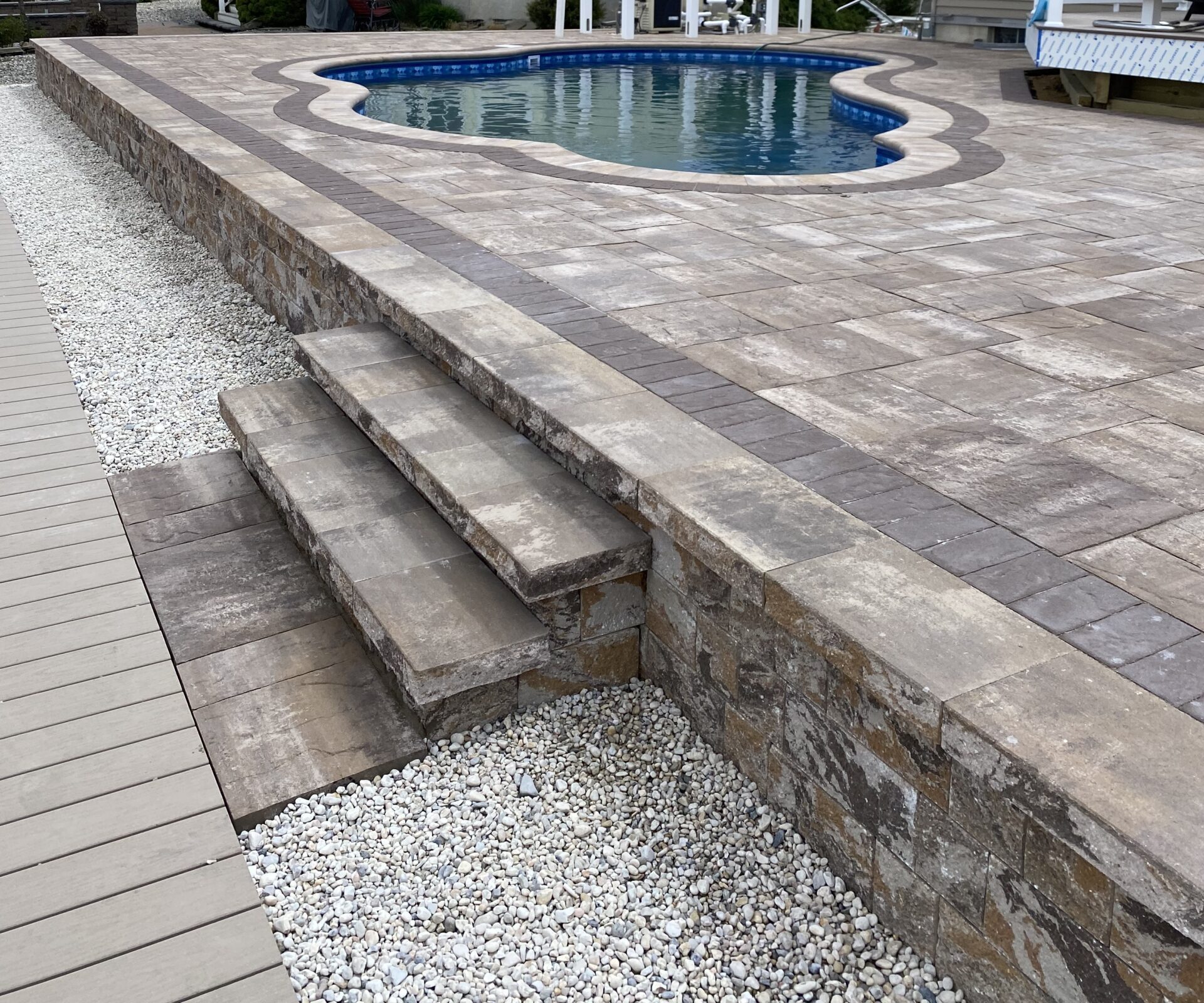Table of Contents
Are Sealed Pavers Worthy?
When it comes to enhancing your outdoor space, paver patios are a popular choice due to their durability, aesthetic appeal, and versatility. However, homeowners often find themselves debating whether to seal their pavers or leave them natural. As a family-owned business based in Ocean County, New Jersey, Jersey Shore Pavers has years of experience in transforming outdoor areas. In this comprehensive guide, we will explore the pros and cons of sealing pavers, helping you make an informed decision for your patio.
Understanding Paver Sealing
Paver sealing refers to the process of applying a protective coating over pavers to enhance their appearance, protect against stains, and prolong their lifespan. This process can involve different types of sealers, including:
- Film-Forming Sealers: These create a protective layer on the surface of the pavers, providing a glossy finish and excellent stain resistance.
- Penetrating Sealers: These absorb into the pavers, providing protection without altering the surface appearance. They are ideal for maintaining a natural look.
The Benefits of Sealing Pavers
Sealing your pavers offers several advantages that can enhance both the appearance and longevity of your outdoor space:
1. Stain Resistance
One of the primary benefits of sealing pavers is increased resistance to stains. Sealed pavers are less likely to absorb spills from food, beverages, oil, or other substances, making cleanup much easier. This is particularly beneficial for outdoor spaces where barbecues and family gatherings take place.
2. Enhanced Color and Appearance
Sealers can enhance the natural color of pavers, making them look more vibrant and new. Film-forming sealers can provide a glossy finish that highlights the paver’s texture and color, adding to the aesthetic appeal of your outdoor space.
3. Protection from Weather Damage
Sealing your pavers can help protect them from harsh weather conditions, such as rain, snow, and UV radiation. This protection can prevent fading, cracking, and other forms of damage that can occur over time, extending the lifespan of your patio.
4. Weed and Moss Control
Sealed pavers can reduce the growth of weeds and moss between paver joints. This is because the sealing process minimizes the amount of dirt and moisture that can accumulate, creating a less hospitable environment for these unwanted plants.
5. Easier Maintenance
Sealed pavers require less maintenance compared to unsealed ones. Cleaning sealed pavers is generally quick and straightforward, as dirt and stains are less likely to adhere to the surface. Regular sweeping and occasional washing can keep your patio looking great with minimal effort.
The Drawbacks of Sealing Pavers
While sealing pavers has its benefits, there are also potential drawbacks to consider:
1. Initial Cost
The cost of sealing pavers can be a significant consideration. Professional sealing services can range from $0.50 to $2.00 per square foot, depending on the type of sealer used and the size of the area. For larger patios, this cost can add up quickly.
2. Maintenance Requirements
While sealed pavers are easier to clean, the sealant itself requires maintenance. Depending on the type of sealer used, you may need to reapply it every 1 to 3 years to maintain its protective properties. This can add to the long-term costs of having sealed pavers.
3. Potential for Slippery Surfaces
Some film-forming sealers can create a slippery surface, especially when wet. This can be a safety concern, particularly around pool areas or where water tends to accumulate. It’s essential to choose a non-slip sealer if this is a concern for your patio.
4. Change in Appearance
While many homeowners appreciate the enhanced color and gloss from sealing, others may prefer the natural look of unsealed pavers. Sealing can change the appearance of your pavers, which may not align with your aesthetic preferences.
When to Seal Your Pavers
Deciding whether to seal your pavers depends on several factors, including your location, the type of pavers, and your personal preferences. Here are some scenarios in which sealing may be beneficial:
- High-traffic Areas: If your patio experiences heavy foot traffic, sealing can help protect against wear and tear.
- Near Water Features: For patios near pools or water features, sealing can prevent water damage and algae growth.
- Harsh Weather Conditions: In areas with extreme weather, sealing can provide added protection against the elements.
When You Might Skip Sealing
On the other hand, there are situations where it may be best to leave your pavers unsealed:
- Natural Aesthetic Preference: If you prefer the look of natural pavers without the gloss, sealing may not be necessary.
- Low Traffic Areas: For patios that are seldom used, the extra protection of sealing may not be worth the cost and effort.
- Budget Constraints: If you’re on a tight budget, you may decide to forgo sealing and focus on regular maintenance instead.
How to Seal Your Pavers
If you decide that sealing your pavers is the right choice for you, here’s a step-by-step guide to ensure a successful application:
1. Clean the Pavers
Before sealing, thoroughly clean the pavers to remove dirt, debris, and stains. Use a pressure washer or a stiff broom and paver cleaner for best results. Allow the pavers to dry completely before proceeding.
2. Choose the Right Sealer
Select a sealer that fits your desired finish (glossy or matte) and provides the necessary protection for your climate and usage. Consult with a professional or a knowledgeable supplier for recommendations.
3. Apply the Sealer
Follow the manufacturer’s instructions for application. Generally, you can apply the sealer using a sprayer, roller, or brush. Ensure even coverage and pay extra attention to the joints between pavers.
4. Allow to Dry
After applying the sealer, let it dry according to the manufacturer’s guidelines. Avoid walking on or using the patio until the sealer has fully cured.
5. Regular Maintenance
After sealing, maintain your patio through regular cleaning and reapplication of the sealant as recommended. This will help ensure the longevity and appearance of your pavers.
So, What To Do?
The decision to seal your pavers or leave them natural ultimately comes down to your personal preferences, budget, and usage patterns. While sealing offers numerous benefits, including stain resistance, enhanced appearance, and protection from weather damage, it also comes with costs and maintenance requirements.
At Jersey Shore Pavers, we are dedicated to helping you create an outdoor space that you’ll cherish for years to come. Whether you choose to seal your pavers or embrace their natural beauty, we offer expert guidance and quality craftsmanship to bring your vision to life.
Ready to enhance your outdoor space? Contact Jersey Shore Pavers today for free estimate on your paver needs, and let us help you create a beautiful and functional patio you’ll love!



